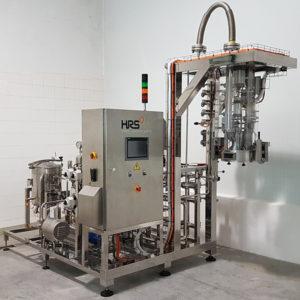Assisting product development with new mini aseptic solution
In today’s fast moving food and drink industry innovation is king. Everyone is looking for the next product to give their business the edge and food fashions and trends come and go with increasing speed.
Food manufacturers often need to use seasonal ingredients, potentially offering limited edition flavours or varieties of key products: from herbal ice creams and summer berry drinks, to fruity condiments and vegetable smoothies.
As a result, the life of innovative products is often shorter than has been seen previously and it can be hard for new product developers and marketers to pick which will survive in the market and which will fall away. All of these factors create challenges for operational factories and production lines. No business wants to invest in a fully-scaled line for a product that may have limited (albeit still successful) sales.
The new HRS Asepticblock Mini Series allows manufacturers to produce new trial products with the minimum amount of product in a short time, reducing the unnecessary expense or wastage that can accompany full scale trials, and alleviating the need to suspend or interfere with the routine production of regular products. It allows the reproduction of a full scale final pack, but from as little as 20 to 50 kg of product.
The Aseptic Mini Block Series was born from the need of many of small- and medium-sized customers to produce relatively small quantities of aseptic products, but who are prevented from doing so by high upfront capital costs and low return on investment.
Traditional aseptic processing lines consist of two sections; one section is the steriliser or pasteuriser (based on a suitable heat exchanger according to the product type), and the other is the aseptic filler.
The HRS Asepticblock Mini Series is designed for such producers working with a range of high value products including fruit and vegetable purees, fruit based products, condiments, sauces, soups, prepared foods and many others.
The design combines both the steriliser/pasteuriser and aseptic filler in one package, mounted on a single frame with a single control panel. As well as resulting in a compact and flexible unit which requires less space, the material and manufacturing costs are significantly reduced, meaning that prices for the Asepticblock Mini are up to half of those associated with conventional units.
One of the first customers is a multi-national food and beverage company, specialising in the production of own-label fruit products, juices, smoothies, drinks and ice cream.
With just 20 to 50kg of product, the company can replicate their full industrial process, producing the end product in the same aseptic format as they would with the full industrial scale system.
The Asepticblock Mini was installed in their Spanish production plant and linked to other equipment, such as blending tanks and homogenisers, so that they are now able to process a wide range of different products on-site without the need for any external processes. This has greatly increased the agility of their R&D process and facilitated new product development.



